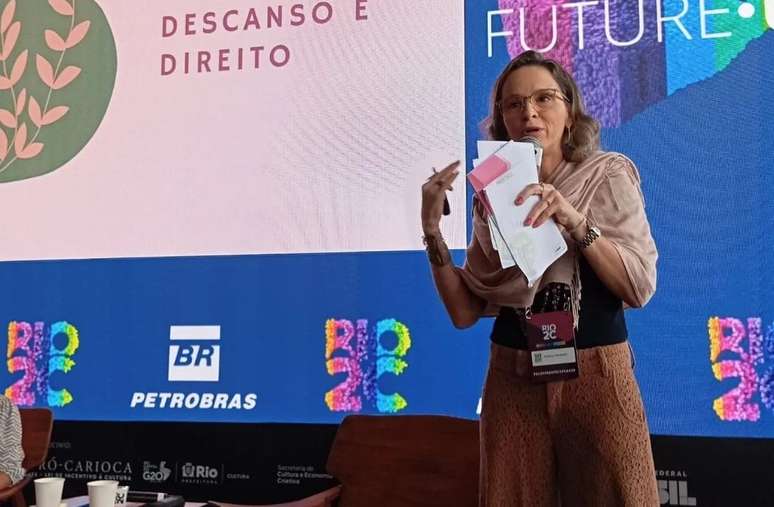The journalist founded Desacelera SP to help people and companies escape from “automaticity”
The hectic routine of largest city in Latin America led journalist Michelle Prazeres to create the project Slow down SP. Lifestyles change and a new way of dealing with time These are examples of measures that the founder of the platform tries to share so that people can get out of the “automatic mode” and regain their well-being.
Receive the main news directly on WhatsApp! Subscribe to the Terra channel
In conversation with the Earth, the communicator talked about problems, solutions and explained the way in which the initiative addresses the professional and personal world. For her, the acceleration of big cities is a collective issue, not an individual one.
“I began to understand that acceleration is not just a perception of individual people. It is a collective condition. When you live in a fast-paced culture, you tend to respond to this acceleration, because you are automatic,” Prazeres said.
Therefore, according to the journalist, only measures such as therapy, skin care and meditation not enough. These actions must be taken together with the initiatives and changes in common thinkingIt’s inside how society views time.
“The culture of competitiveness and productivity, from a social point of view, are big problems. […] The current discussion leads us to think about solutions also on an individual level, that is, that people take care of themselves, take care of their skin, meditate… all this is very important. Go to therapy. And it would be very important for everyone to have access to it. But when we prescribe it, without taking care of the organizational, interpersonal and social aspects, we are more violent towards those who cannot do it,” she explained.
Highlighting problems and solutions, the journalist reiterates that this is the case It is important that rest occurs with wellbeing in mind and not just as a way to regain productivity.
“And we don’t need to stop to be more productive later, we need to stop because we are human beings,” Prazeres said.
Start of the Desacelera SP
The starting point for the creation of Desacelera SP came with Prazeres’ pregnancy. At the time the journalist was dedicated to three jobs, studies and research. With tiredness of routine and the desire to face the pregnancy unhindered and safely, she decided that it was possible to “live with enough”
“We started Desacelera SP with a guide to slow down people in the city, from 2015 to 2016. And then, it was very biographical, from a moment in my life that I was going through and I thought, well, I’m from the Northeast in Sao Paulo, I always found the rush of São Paulo strange. And I said: ‘There may be other people who, like me, find the acceleration of this city strange. And then I created a guide to slow down people here,’ began the founder of the project.
Prazeres, however, heard from some people that it wasn’t possible to get the desired slowdown in a city like that St. Paul. The journalist then reflected on the situation and understood that part of the Brazilian discourse on well-being was imported from countries with different realities.
“People said they couldn’t slow down in a city that doesn’t let us slow down. And then I started to understand that there were aspects of wellness and mental health care and slowing down that were tied to a conversation that came from another place. Every notion of well-being, care and mental health that we have is imported from the United States and Europe, which are contexts where the inequality that exists here in Brazil does not exist.“he recalled.
At the start of the initiative, Prazeres visited places of work and study to share his ideas for slowing down. One of the important points for the development of the project, however, was the completion of the Unhurried daywhich brought together more than 1,500 people in 2018. A few years later, in 2023, the project grew and the Instituto Desacelera SP was opened.
The entire process, however, was conducted with distrust and judgment from third parties: “With my research, I also had to face a certain prejudice, you know, in a country like Brazil, where being slow is seen as lazy. And then I have to explain, ‘Oh, it’s not about being slow.’ It’s because the world is so accelerated that there has to be someone who says, “Guys, wait, is this really urgent?” Does it have to be now?”
Acceleration as a collective issue
From the first steps of the project, the journalist began to consider race in São Paulo as an issue that goes beyond the individual. For her, people live in an accelerated way as an automatic response to the acceleration of organizations, cities and companies.
“I began to understand that acceleration is not just a perception of individual people. It’s a collective condition, so it’s not just that I feel accelerated, right? When you live in a fast-paced culture, you tend to respond to this acceleration, because you’re automatic, and so we stop thinking about when, in fact, speed makes sense and when it doesn’t,” she explained.
According to the journalist, this acceleration must be contained for the well-being of people. According to Prazeres, the way society sees time is one of the problems of routine.
“The feeling I have is that what is really urgent is to stop. Let’s pretend people don’t get sick. I think this idea is a big problem from a social point of view and we have other paradigms to draw inspiration from, right? The paradigms of traditional peoples, of indigenous peoples, of African peoples, who relate to time and nature in different ways, and we consider that there is only one way of living, which is this Western way that we have learned, and which brings a way of life related to time, which is as if it were a resource. So I think that the culture of competitiveness, the culture of productivity, from a social point of view, are also big problems,” the communicator reflected.
How to slow down?
Prazeres knows it’s no easy task to help people change the way they relate to productivity and rest. Despite this, he continues to work to raise awareness.
Although he doesn’t agree, he explains that productivity also improves when professionals are more motivated and, of course, rested: “I consider it a paradox. I don’t think we need to deal with slowing down to be more productive, but it is inevitable that we will have to deal with this paradox. There’s a lot of research that shows this story that when people are cared for more, when we take more breaks, when they feel like they’re being watched and listened to in work environments, those work environments become more productive.”
More than working hours, Prazeres sees as points to discuss the time dedicated to issues related to the profession and traveling to the site, for example.
While it is still something in the testing phase, he cited the four day a week projectwhat a sight reduce working hours to four days a weekand commented on the relationship between rest and respect and reduction of workload.
“This whole workday thing is a real enigma. The Four Day Week is a movement that is trying to experiment with some possible solutions in relation to the reduction of working hours, which is applied to some specific contexts, right, so I think it would be worth doing a separate research. Without a doubt, the slowdown agenda touches the work agenda in this place of respecting working hours and reducing working hours. What technology does is break down the boundary between work time and life time. So, especially when we try jobs that have this level of technology, we tend not to respect these limits of working hours, so I think it is a parallel research,” said the journalist.
To raise awareness of the slowdown, the Prazeres project also works directly with companies. According to the founder, the work is carried out by local employees and leaders.
“What we do are coexistence, experience and awareness-raising activities within companies that want to start building cultural changes. We go into companies, talk to people and, finally, work with leaders, so that these leaders become aware and so that cultural transformations can take place. From time to time we carry out a lesson at a workshop or a consultancy. Starting from this, we build care, well-being and mental health solutions adapted to that context and, in parallel, we carry out training work to raise awareness among leaders so that people can be empowered to enjoy what now exists there,” she concluded. .
Source: Terra
Ben Stock is a lifestyle journalist and author at Gossipify. He writes about topics such as health, wellness, travel, food and home decor. He provides practical advice and inspiration to improve well-being, keeps readers up to date with latest lifestyle news and trends, known for his engaging writing style, in-depth analysis and unique perspectives.








